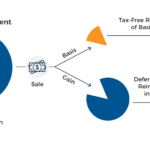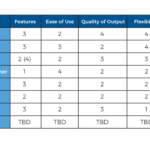Real estate investors have long enjoyed a number of unique tax benefits, from the tax deductibility of depreciation, to the ability to defer capital gains with a like-kind 1031 exchange. And beyond these core tax benefits of real estate investing itself, Congress has, from time to time over the years, provided additional tax incentives for particular types of real estate development opportunities, as a way to further guide where real estate developers may direct their capital. The latest version, created under the recent Tax Cuts and Jobs Act (TCJA) of 2017, is the so-called Qualified Opportunity Fund (QOF), which offers some especially unique tax benefits for those who are willing to invest in certain low-income areas designated as "Qualified Opportunity Zones".
Specifically, investing into a QOF offers the ability to defer tax on capital gains from the sale of existing property that are reinvested within 180 days into a QOF (including not only a rollover of real estate proceeds akin to a 1031 exchange, but even allowing the rollover of capital gains from intangible assets like stocks), subsequent basis increases on deferred capital gains reinvested into a QOF after five years (and again after seven years), and the complete elimination of capital gains tax on growth attributable to gain reinvested in a QOF (if the QOF is held for at least 10 years).
The caveat, however, is that, in order to receive the full array of QOF benefits, the latest date (according to the current tax code) that gains on the sale of assets can be invested into a QOF is December 31, 2019. Past that date, investors will begin to at least partially lose out on basis increases and, thanks to what’s widely assumed to be poor drafting, potentially lose out on other future tax benefits as well. Furthermore, the deferral of the gains on the funds used in the initial investment isn’t perpetual. Gains timely reinvested into a QOF will become taxable (except for any basis increases received after years 5 and 7) at the end of 2026 (or when the QOF is sold, if sooner).
Meanwhile, despite the attractive tax benefits, advisors should exercise caution and perform their normal investment due diligence before jumping in with both feet. Bad investments with good tax attributes are, at the end of the day, still bad investments. Questions such as “What are the management team's qualifications?”, “What are the expenses to investors of the fund?” and “What sort of assets (which, by their very nature, are illiquid) will the fund be targeting?” are all essential to answer. Not to mention the actual merits and growth or income opportunity of the particular real estate investment itself.
Nonetheless, investors who have sold appreciated assets within the past 180 days, or plan to do so in the near future, should evaluate the merits of investing into a QOF. However, the reality is that many investors’ tax planning needs will be better served by using existing strategies, including 1031 exchanges, charitable trusts, and simply holding on to existing assets – all of which may provide tax benefits, including indefinite tax deferral, and the opportunity for a future step-up in basis at death that a QOF does not provide.




 Welcome back to the 93rd episode of the Financial Advisor Success podcast!
Welcome back to the 93rd episode of the Financial Advisor Success podcast!




